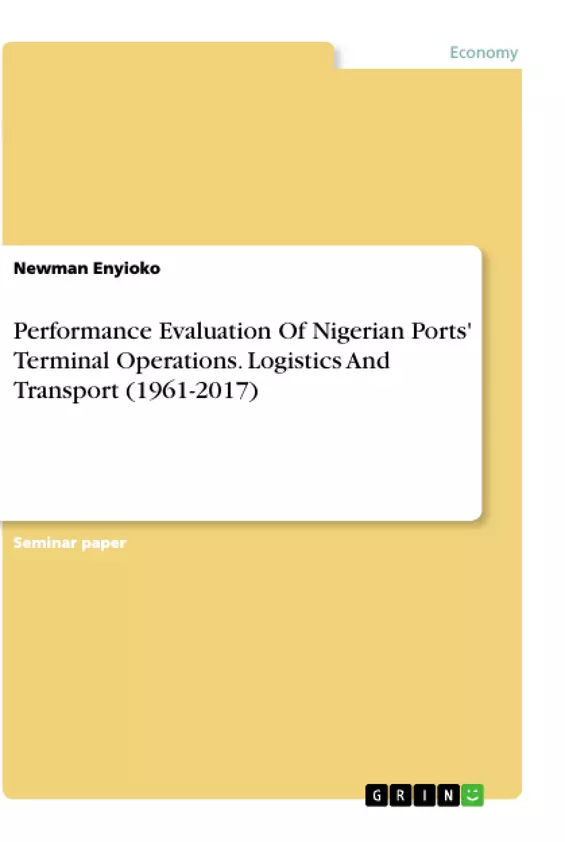This paper x-rayed the performance of the Nigerian ports at terminal operations vis-à-vis logistics/transport activities from 1961-2017. The data on cargo movement were derived from the Nigerian Port Authority Annual Reports. The study relied on descriptive statistics, trend analysis, regression analysis of ordinary least square estimate and port performance indicators such as awaiting berth, at-berth, berth occupancy and throughput in explaining the trend of port performance for the periods under review.
The trend analysis employed to explain the trend of cargo movements in all the ports in Nigeria was the Quarterly Moving Averages. It was revealed that the trend of cargo throughput in Nigeria is determined by the inward cargo movement. The analysis also revealed a fluctuation in cargo movement from 1961 to 2005 while the cargo throughput continues to increase unabated from 2006 to 2017. The concession of the port must have been responsible for this upward movement in cargo trend. There was a remarkable increase in inward and outward cargo movement during the post concession era in comparison to the pre-concession era.
Conclusively the performance evaluation has revealed that there is no significant relationship between awaiting berth (as a performance indicator in Nigerian ports) and the real gross domestic products in Nigeria; there is no significant relationship between the at-berth (as a performance indicator in Nigerian ports) and the real gross domestic products in Nigeria, there is no significant relationship between the effect of berth occupancy (as a performance indicator in Nigerian ports) and the real gross domestic products in Nigeria and there is no significant relationship between the throughput (as a performance indicator in Nigerian ports) and the real gross domestic products in Nigeria from 2000 to 2017. This paper recommends that government encourages public ownership and private sector operations of the port infrastructure in Nigeria so that the ports can perform optimally.
Inhaltsverzeichnis (Table of Contents)
- Introduction
- Literature Review
- Historical Background of Port Development in Nigeria
- Comparative Analysis of Nigerian Ports Performance during the Pre- Concession and Post Concession Periods
- Methodology
- Data Analysis and Results
- Trend Analysis of Cargo Throughput
- Performance Indicators
- Discussion
- Conclusion and Recommendations
Zielsetzung und Themenschwerpunkte (Objectives and Key Themes)
This paper examines the performance of Nigerian ports in terminal operations, analyzing logistics and transportation activities from 1961-2017. The study aims to evaluate the impact of port concession on cargo throughput and identify key performance indicators for measuring port efficiency. The paper analyzes trends in cargo movement, assesses the relationship between port performance indicators and economic growth, and provides recommendations for improving port operations in Nigeria.
- Performance Evaluation of Nigerian Ports
- Impact of Port Concession on Cargo Throughput
- Port Performance Indicators and Economic Growth
- Logistics and Transportation in Nigerian Ports
- Recommendations for Enhancing Port Operations
Zusammenfassung der Kapitel (Chapter Summaries)
The Introduction section provides an overview of the importance of ports in Nigeria, outlining the historical context of port development and the shift towards a landlord port model following port concession in 2006. The Literature Review chapter delves into the historical background of port development in Nigeria, tracing its evolution from the 19th century and highlighting the impact of major events, including the civil war, on the port industry. This section also examines the comparative performance of Nigerian ports during the pre-concession and post-concession periods.
Schlüsselwörter (Keywords)
This paper focuses on key terms such as performance evaluation, performance indicators, logistics, transport, and Nigerian ports. The study analyzes the relationship between port performance and economic growth, emphasizing the importance of efficient logistics and transportation systems for national development. The paper also examines the effectiveness of port concession as a strategy for improving port operations in Nigeria.
Frequently Asked Questions
How did the 2006 port concession affect Nigerian ports?
The concession led to a significant and sustained increase in cargo throughput and improved terminal operations compared to the pre-concession era.
What are the key performance indicators for Nigerian ports?
The study uses indicators such as awaiting berth, at-berth time, berth occupancy, and cargo throughput to measure port efficiency.
Is there a link between port performance and Nigeria's GDP?
The analysis revealed no significant statistical relationship between specific port performance indicators and the real gross domestic product (GDP) from 2000 to 2017.
What determines the trend of cargo throughput in Nigeria?
The trend is primarily determined by inward cargo movement, which has shown a steady increase since the port reforms.
What are the recommendations for improving Nigerian ports?
The paper recommends encouraging public ownership combined with private sector operations to ensure optimal performance of port infrastructure.
What period does this performance evaluation cover?
The study analyzes logistics and transport activities in Nigerian ports over the period from 1961 to 2017.
- Citar trabajo
- Dr. Newman Enyioko (Autor), 2020, Performance Evaluation Of Nigerian Ports' Terminal Operations. Logistics And Transport (1961-2017), Múnich, GRIN Verlag, https://www.grin.com/document/978320



